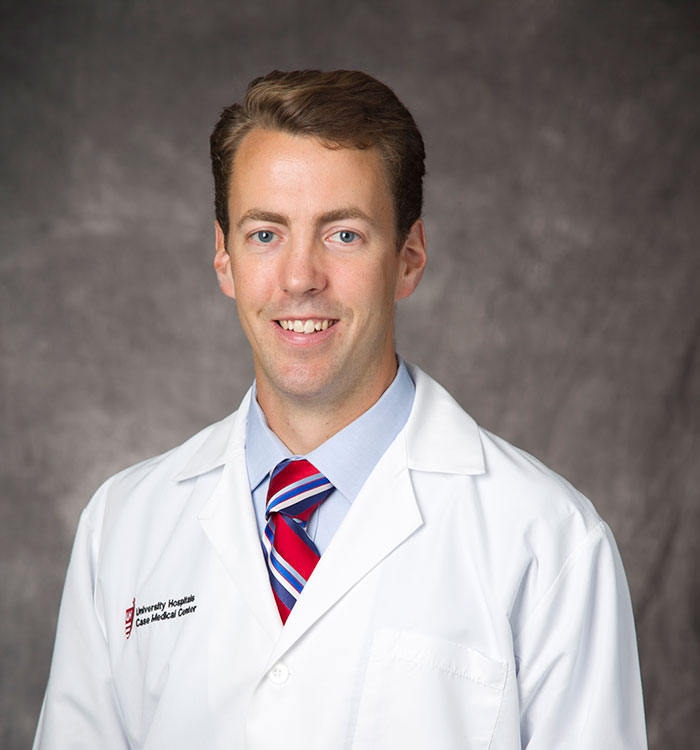In the Spotlight: Robert J. Gillespie, MD
August 30, 2018
Shoulder and elbow surgeon balances practice, research and education
Innovations in Orthopaedics - Fall 2018
 Robert J. Gillespie, MD
Robert J. Gillespie, MDPatients express gratitude in many ways – a card, a positive review or even by simply resuming their daily lives. Not many donate $1.5 million and establish their surgeon as an endowed chair.
As the inaugural Michael and Grace Drusinsky Endowed Chair in Orthopaedic Surgery and Sports Medicine, Robert J. Gillespie, MD, Chief, Shoulder and Elbow Surgery, Associate Program Director, Orthopaedic Surgery, UH Cleveland Medical Center, and Associate Professor, Orthopaedics, Case Western Reserve University School of Medicine, receives annual support to advance clinical research and ongoing medical education. He also has the resources to explore alternatives to traditional orthopaedic surgery treatments.
“Without the support of the Drusinskys and other benefactors, we wouldn't be able to pursue research while continuing to provide excellent patient care in the current healthcare environment,” says Dr. Gillespie, Associate Residency Program Director and Associate Professor in Case Western Reserve University's Orthopaedic Surgery Department and Chief of the Shoulder and Elbow Surgery division of University Hospitals Cleveland Medical Center and Ahuja Medical Center. “Michael and Grace showed their appreciation in a very generous way.”
The appointment comes only eight years after Dr. Gillespie completed his residency at UH Cleveland Medical Center. He completed his shoulder and elbow fellowship at the internationally recognized Rothman Institute in Philadelphia, the same city where he attended medical school. Rather than stay in the City of Brotherly Love, he chose to build his life and career in Cleveland.
“My wife and I both trained at UH, and I had an opportunity to reconnect with colleagues and build a successful career in academic medicine here,” he says. “We loved Cleveland and saw it as a great city to develop our careers and raise a family."
INNOVATION IN PRACTICE, RESEARCH AND EDUCATION
Dr. Gillespie's role at UH balances surgery, research and teaching. As a shoulder and elbow surgeon, he treats everyone from high school sports stars and weekend warriors to seniors battling arthritis.
“We tailor our approach to who they are and what they do,” he says. “For athletes, we have to consider what sport they play, what grade they're in and if they have aspirations of [NCAA] Division I sports. On the flipside, an 85-year-old with arthritis may want to improve her life through shoulder replacement.”
Dr. Gillespie says shoulder and elbow surgical techniques, implants and treatment are all rich with innovation. One current project, led by Ozan Akkus, PhD, who established Case Western Reserve University's Orthopaedic Bioengineering Laboratory (OBL), aims to use a novel fabricated collagen to improve outcomes for rotator cuff tears and irreparable tendon injuries.
Dr. Akkus developed a method to fabricate electrochemically aligned collagen (ELAC) threads with properties that match native tendon. When a surgeon applies a patch of this collagen onto the tendon, it differentiates into tendon-like tissue with the help of growth factors and stem cells.
Dr. Gillespie, an investigator on the project, says current animal studies show promising results. “Our hope is to have a higher success rate in difficult tendon surgeries, as well as increase healing rate and time to return to work,” he says. “It has the potential to be a real game-changer for orthopaedics and rotator cuff surgery.”
A study funded by Ohio Third Frontier, a state organization committed to innovation, to decrease opioid use recently began clinical trials with the help of Dr. Gillespie and James Voos, MD, head team physician for the Cleveland Browns, Division Chief for UH Cleveland Medical Center's Sports Medicine Department and Director of UH's Sports Medicine Institute. The study will research whether cold therapy administered by Innovative Medical Equipment's ThermaZone device decreases opioid use after surgery.
“Cold therapy is an easy way to treat pain without medication,” says Dr. Gillespie. “The results of this study could change how we do things in knee and shoulder surgery. We're honored to collaborate with the State of Ohio in its efforts to curb opioid addiction.”
Although Dr. Gillespie devotes many hours to research and innovation, he reminds his residents and fellows to observe before adopting new technology. “You don't want to immediately jump to the newest and greatest,” he says. “At UH, we're pushing the envelope with what we're researching and bringing to human studies. Over time, this translates to improved clinical outcomes.”
To make an appointment or discuss a patient case with Dr. Gillespie, call 216-844-7200.


